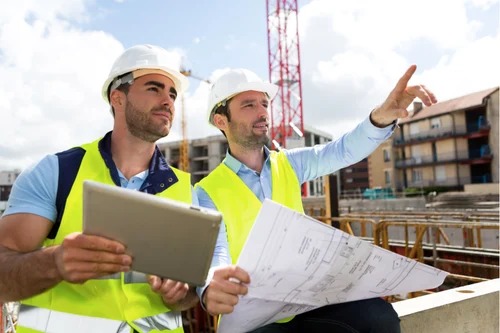Construction projects, big or small, start with one critical foundation: safety. When safety is intertwined with quality, the result is a structure that lasts generations, notes Sand Dollar Management group. “Special inspection” is an essential component of the construction process. It ensures that building materials and methods meet set standards, keeping construction both on track and safe.
Whether you’re embarking on a new construction project or ensuring compliance with regulations in ongoing work, here’s everything you need to know about special inspections for building materials.
What Is Special Inspection?
Special inspections are a set of quality assurance tasks carried out by certified professionals to verify that construction practices and building materials comply with approved plans and standards. These inspections are typically required by building codes, allowing project managers, contractors, and building owners to ensure safety and reliability throughout the construction process.
From concrete to steel, every material included in a construction project is tested during a special inspection to meet specific criteria for quality, stability, and durability.
Why Are Special Inspections Necessary?
Special inspections are vital for several reasons, all aimed at guaranteeing the safety, functionality, and integrity of construction projects.
- Compliance with Regulations
Building codes specify material strength, loads, and tolerances that structures must meet. Special inspection Massachusetts ensure all materials are compliant with the latest regulatory standards.
- Prevent Structural Failures
Hidden faults in building materials can lead to devastating outcomes, including structural collapses. Special inspections identify issues before they become safety hazards.
- Cost Efficiency
Early identification of substandard materials cuts down on costly repairs and replacements later on. Special inspections ensure that a project progresses smoothly without unexpected roadblocks.
- Boost Client and Stakeholder Confidence
When a construction project undergoes rigorous inspections, clients and stakeholders have greater assurance in the quality and safety of the final structure.
What Does a Special Inspection Cover?
Special inspections are comprehensive and target numerous aspects of building construction. Some areas of focus include the following building materials and processes.
Concrete Testing
Concrete forms the backbone of many construction projects, and its strength is critical. Special inspections for concrete assess properties like mix ratios, curing conditions, slump, and compressive strength. These tests ensure durability and load-bearing capabilities.
Structural Steel Examination
Steel is essential for creating stable frameworks. Inspections for structural steel check for properties such as tensile strength, weld quality, and bolt placement, ensuring it adheres to code standards.
Masonry Construction
Masonry materials, such as clay bricks, mortar, and blocks, undergo tests to verify uniformity and durability. Special inspection Rhode Island ensure that masonry work is performed according to design specifications.
Wood Framing Evaluation
For wood-based construction, inspectors assess the quality of timber, connections, and assembly to confirm compliance with structural requirements.
Fireproofing and Firestopping Systems
Fireproofing materials, including coatings and passive firestopping systems, are inspected to validate their ability to resist fire and slow its spread, ensuring safety over time.
Soil and Foundation Analysis
A structure is only as strong as the foundation it rests on. Special inspections cover soil conditions, compaction levels, and fill material quality to ensure stability.
Welding and Bolted Connections
Inspections for welding and bolted connections are performed to ensure they meet strength requirements under specific loads.
Roofing Material Verification
Roof systems often face extreme weather conditions. Inspectors verify the quality of membranes, shingles, or other roofing materials to preserve protection and durability.
Who Performs Special Inspections?
Special inspections are performed by trained, certified inspectors. These professionals bring expertise in analyzing building materials and construction practices. They are typically licensed engineers or technicians with specialized knowledge, ensuring that all inspections are thorough and accurate.
Each inspector focuses on specific aspects of construction, such as concrete testing, steel inspections, or soil analysis, depending on the project’s requirements.
The Process Behind Special Inspections
- Pre-Inspection Preparation
Before construction begins, inspectors meet with project stakeholders to review plans, define inspection criteria, and establish testing schedules.
- On-Site Inspections
Inspectors visit the construction site during critical phases, such as the pouring of concrete or steel erection, to monitor compliance with approved plans and materials.
- Testing and Reporting
Samples of materials (such as concrete, steel, or soil) are collected and tested in certified labs. Inspectors compile reports based on their findings and communicate any discrepancies promptly.
- Corrective Measures
If issues are identified, contractors address them immediately to bring the materials or methods into compliance. Follow-up inspections ensure the corrections meet standards.
- Final Inspection
A comprehensive final inspection takes place once construction is near completion. This process ensures that all building elements meet the required codes and standards.
Benefits of Investing in Special Inspections
Investing in special inspections adds a layer of accountability to construction projects, ensuring long-term success and reliability. Here are the key benefits for property owners, builders, and contractors.
- Prevents Project Delays
Special inspections identify issues early, avoiding delays due to last-minute changes or rework.
- Improves Safety Records
Compliance with rigorous inspection standards significantly reduces the risk of accidents or failures.
- Enhances Quality Assurance
With regular monitoring, every component of the construction is carefully evaluated for quality and durability.
- Strengthens Credibility
Contractors and builders associated with high-quality inspected projects build reputations for trustworthiness and reliability.
- Longer Service Life
Structures built with inspected materials often last longer and require fewer repairs over time, reflecting on both the craftsmanship and material quality.
How to Incorporate Special Inspections into Your Project
If you’re planning a construction project, integrating special inspections into your timeline is essential to ensuring successful outcomes. Here’s how to get started.
- Check Building Codes
Research local regulations to understand what materials and construction areas require special inspections.
- Budget for Inspections
Allocate funds for inspections as part of your overall construction budget to avoid unexpected cost overruns.
- Engage Certified Professionals
Hire experienced, certified inspection agencies to ensure a smooth process with accurate results.
- Communicate with Stakeholders
Keep everyone informed about the inspection timeline and criteria to maintain transparency.
- Create a Comprehensive Schedule
Coordinate inspection schedules with critical construction milestones to streamline workflows and minimize delays.
Build with Confidence
Special inspections are an indispensable part of any construction project. By incorporating routine checks for building materials, you not only ensure compliance with building codes but also create structures that are safe, durable, and cost-effective in the long run. Start planning your inspection strategy today and take a proactive step toward building with confidence.

















